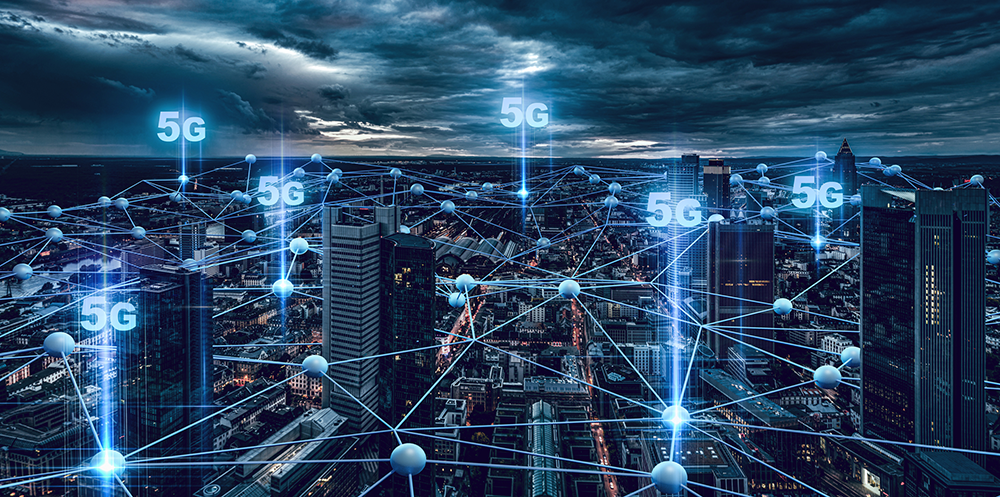In current times it is hard to imagine life without connection. The way of communicating with one another has changed dramatically since the beginning of technological and industrial revolutions, and it concerns not only the communication between humans but also machines. High-speed data distribution is now possible anywhere in the world thanks to wireless networks. This includes more private networks, like Bluetooth and Wi-Fi as well as commercial telecoms like 3G, 4G, and 5G services.
To enable superfast data exchange, the fifth-generation wireless technology will eventually power everything from objects, devices and machines to electric vehicles and power grids. Compared to 4G/LTE, 5G networks will offer 1,000 times more capacity, ten times less latency, and fifty times more speed.
What is 5G?
After the development of 4G wireless mobile technology, researchers and mobile operators teamed up to start designing the next generation of cellular telecommunications, 5G.
The more expanded definition describes 5G as a cellular network that has its service areas divided into relatively small regions known as cells. Using radio waves and a local antenna within the cell, all 5G wireless devices in a given area are linked to the phone and Internet networks. The latest networks provide faster download rates, which might potentially reach 10 gigabits per second (Gbit/s). In addition to being faster than its predecessors, 5G also has a higher bandwidth and can connect different types of devices, enhancing the quality of Internet services in crowded areas.

Even though there is 6G on the horizon (to be launched around 2030), 5G will yet spread its wings since its deployment in 2019 worldwide. As according to many sources the entire economic impact of 5G will probably be released globally by 2035.
Statista and GSM Association predicts that by 2025, 5G networks will have more than 1.7 billion subscribers and represent 25% of the global market for mobile technology.
The role of Industrial 5G
A lot of companies rely on a high-speed wireless connection. The level of automation in industries has led to the globalisation of control and data monitoring structures. This brings the term ‘industrial 5G’ to the fore as the fifth-generation wireless technology is very popular in machine-type communication and the Internet of Things (IoT). It enables unprecedented reliability, reduced latency, increased capacity and improved QoS (Quality of Service).
5G incorporates improved access technologies like BDMA (Beam Division Multiple Access) and FBMC (Filter Bank Multi-Carrier Multiple Access), meaning it has the ability to completely transform industries like manufacturing, healthcare, energy and transportation (as we mentioned in the top technology trends article for 2023, according to 97% of the IEEE survey respondents, 5G will impact vehicle connectivity and automation in 2023).
Benefits of Industrial 5G
- High speed and low latency
- Stronger security, e.g. the private 5G network has the capacity to exclude certain categories of security concerns
- Improved speed of communication and reliability
- Remote monitoring of operational control aspects
- Monitoring in real-time for advanced diagnostics, performance monitoring, and gathering statistical process control data
- Providing a high level of flexibility and efficiency as it is built specifically for smart factories (Industry 4.0) and the Industrial Internet of Things (IIoT)
- Lower costs with the single access point architecture (devices further downstream do not have to pay for 5G subscription services)
- Giving businesses complete control over their connection requirements
- Thanks to private networks, companies may track, store, analyse, direct, and adjust data flow
Private networks for industrial IoT
There are billions of subscribers on public 5G networks worldwide, using it mainly for faster devices and high-resolution streaming. However, the new mobile communication standard is far more than that. Constructing private 5G networks (also called non-public networks) gives all of the speed, quality, and dependability of public 5G on top of additional protection and control of a standalone network. New levels of support for privately owned, operated, and secured 5G networks are offered by the most current 5G release. These private networks enhance application latency while enabling the on-site storage of sensitive Industrial IoT deployment data collection.
The 5G networks are more appropriate for private use compared to other standards. 3G, 4G and 5G signals do not penetrate; thus, additional cell towers must be placed in more locations to bring users closer to the cell towers in order to effectively cover an area with 5G signals of adequate integrity. Therefore, many companies are starting to focus on the advantages of 5G connectivity as modern 5G devices, such as handhelds, switches, routers, and base stations, are altering the design of cell towers and enabling the deployment of private 5G networks by individuals, organisations, and institutions.
In collaboration with Ericsson and Quectel, Phoenix Contact designed the first industrial 5G router for use in local industrial applications on private 5G networks. Industrial applications, including machines, controllers, and other devices, may be linked to a private 5G network using this 5G router, enabling them to coordinate their resource usage, priority setting, and behaviour.
Similar to Phoenix Contact, the advancement of Industrial 5G is being driven by Siemens. A private standalone 5G network in an industrial setting that is solely based on Siemens prototypes has been established, in addition to the announcement of the new mobile Industrial 5G routers.
Which industry will benefit the most from 5G?
5G will change the economy by interconnecting devices and people. With the help of 5G networks, businesses can create smart factories and fully utilise innovations like automation, artificial intelligence, augmented reality for problem-solving, and the Internet of Things (IoT).
Manufacturing
5G is the first widely utilised wireless network designed for industrial applications. It means 5G provides the scalability and dependability needed to support the countless smart devices and sensors used in the manufacturing sector. It is especially beneficial for manufacturing as it can reduce human error and increase automated processes with large-scale “machine-to-machine” connectivity.
Benefits of private 5G networks:
- Real-time control of advanced robotics.
- Mobile end device connectivity.
- Standardised connectivity for sensor technology.
- Predictive maintenance and autonomous system control and monitoring.
- Data separation between performance and yield.
- Incorporation of devices and systems into higher-level networks.
- Opportunity to switch from wired to wireless connectivity in a variety of industrial settings.
Transportation
The automotive and transportation industries are moving toward intelligent transportation systems, which will offer several advantages, including improved safety, decreased traffic congestion, better fuel use, and a reduced environmental impact. With emerging intelligent transportation systems, it will be possible for vehicles to be connected and to connect with others, e.g. pedestrians, road infrastructure, etc.
Benefits of private 5G networks in transportation:
- Isolating control systems from the public network.
- Improved baggage and equipment location services.
- Protecting passenger information.
- Ultra-Reliable Low Latency Communication (URLLC) for self-driving vehicles, drones, rescue missions, etc.
- Advancing toward intelligent transportation systems means improved safety, fewer traffic jams, better fuel use, and a favourable environmental impact.
Logistics
As logistics is connected with transportation, 5G might open the door for breakthroughs like autonomous vehicles, drone technology, and real-time data collection by changing the logistics sector to become interconnected and advanced technologically. Besides, countries with the next generation of cellular communication will focus on 5G smart intersections and improve road traffic management by lowering congestion and air pollution around ports and enterprise zones.

Benefits of private 5G networks in logistics:
- VR and emerging technologies solutions.
- Safeguarding consumer and inventory data.
- Real-time updates on product locations and inventories.
- Increased supply chain visibility by offering information on inventory, orders, shipping paths, and other areas of the company’s operations.
Healthcare
The health sector would highly benefit from 5G as it provides high dependability and low latency services. Especially with patient monitoring becoming more remote, 5G can be a key to regular monitoring improvements and patient care solutions.
Benefits of private 5G networks in healthcare:
- Improved precision thanks to innovations like robotic surgical assistance.
- Connected wearables for patients to track critical data.
- Help for personnel thanks to more advanced devices, as staff and doctors would only need to intervene when a problem occurs.
- Real-time incident coverage could become a reality thanks to solutions such as ambulance drones, real-time monitoring devices, etc.
- Development of 3D printing for tools, equipment, and even prosthetics constructions.
- VR solutions, such as headsets, make educating healthcare personnel more realistic than ever before.
The future of communication technologies
Although 5G is already in use and frequencies have generally grown, the industrial sector’s potential for 5G has not been reached yet. In the future, it will coexist with Wi-Fi and other wireless technologies, such as WLAN, WirelessHART, GSM, LTE, etc. or even wire-based media before the possibility of setting it up as a consistent private 5G networks that are tailored to the individual application. Therefore, besides new conversations about 6G, it might still take some time to develop 5G and be able to introduce the new generation standard.
However, industrial 5G networking technology is already impacting smart factories in making decisions, producing products, and maintaining their facilities. Many businesses already create solutions using 5G technology, and soon more companies will benefit from its capabilities. Future smart cities, utilities, power grids, transportation, hospitals, and factories will be powered by 5G because it enables businesses to deploy more devices and sensors in more locations.
If you would like to find out more about 5G, go to the page with our webinar with Kemet about transitioning to the new wireless network.
Frequently Asked Questions
Industrial 5G is the new term describing the role of 5G in the industrial sector. As the future of manufacturing will focus on the Industrial Internet of Things (IIoT), smart factories, and Industry 4.0, as well as 5.0, the correct communication structure and thorough connection are required for designing manufacturing facilities. The brand-new 5G communication standard creates significant new opportunities by offering dependable connection and large bandwidth for data transfer between Edge devices and the cloud.
Private 5G networks are a form of wireless network technology that provide a cellular connection for private network use cases, such as small enterprises, independent service providers, and local governments. Along with other wireless choices, including Long-Term public Evolution (LTE) and public 5G, private 5G is an alternative to Wi-Fi. Private 5G networks are faster, more secure, and use less power than public.
At the moment, 5G is mainly used for streaming and improving the speed of devices. However, soon telecom companies and manufacturers will be able to improve or transform their facilities into smart factories, thanks to 5G networks. The key industries, such as energy, transport, utilities, healthcare and manufacturing, have demonstrated enormous income possibilities for operators aiming to digitise the industry using 5G technology. They assist and improve contemporary technologies, including IoT, augmented reality, automation, and AI.
As everything keeps progressing and there are newer and better technologies, improvements have to happen in the network communication sector. 5G offers faster download speeds, less latency, and increased capacity and connection for billions of devices, improving especially VR, IoT and AI capabilities.
The 5G network’s quick data rates and low latency will enable quick machine-to-machine communication, increasing productivity and lowering the possibility of mistakes. Additionally, more factories will be able to connect to the internet thanks to the 5G network’s enhanced capacity, which will boost automation and productivity.
The adoption of 5G will alter how we make decisions, produce goods, operate factories, and maintain infrastructure. Dramatically lowering the cost of a mobile network and providing high data rates, low latency increased security, and strong, dependable broadband transmission may significantly increase the efficiency and adaptability of industrial value generation.











